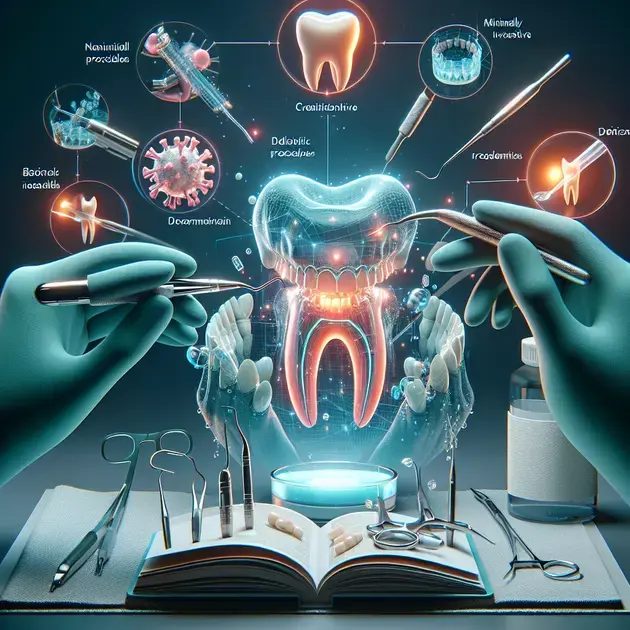When it comes to addressing periodontitis, understanding the role of medication is crucial. Treatment options for periodontitis have evolved over the years, with medication playing a significant role in managing the condition.
Recent studies have highlighted the effectiveness of certain medications in combating the progression of periodontitis. In this article, we will delve into the different treatment options available and the specific role that medication plays in addressing this common dental issue.

Understanding the Importance of Medication
When it comes to managing periodontitis, understanding the importance of medication is crucial in maintaining oral health and preventing further complications. Medications prescribed for periodontitis can help control infection, reduce inflammation, and promote healing of the gums. One of the key steps in understanding the importance of medication is knowing when and how to take the prescribed medications.
A common medication used in the treatment of periodontitis is an antimicrobial mouth rinse. These rinses help reduce bacteria in the mouth and prevent infection. To effectively use an antimicrobial mouth rinse, it is important to follow the instructions provided by your dentist or periodontist. These rinses are typically used after brushing and flossing, and it’s important to swish the solution in your mouth for the recommended amount of time.
Another type of medication commonly prescribed for periodontitis is antibiotics. These medications help control bacterial infections that contribute to gum disease. It is important to take antibiotics as prescribed by your healthcare provider and to complete the full course of treatment to ensure the infection is fully cleared.
Understanding the importance of medication also involves being aware of any potential side effects or interactions with other medications you may be taking. It is important to discuss your medical history and any current medications with your healthcare provider to ensure the prescribed medication is safe and effective for you.
In conclusion, medication plays a significant role in managing periodontitis and maintaining oral health. By understanding the importance of medication and following prescribed treatment plans, you can effectively control gum disease and prevent further complications.
Exploring Different Treatment Options
When it comes to managing periodontitis, exploring different treatment options is essential to finding the best plan for your oral health needs. There are several treatment options available for periodontitis, and it’s important to work with your dentist or periodontist to determine the most appropriate treatment for your specific condition.
One common treatment option for periodontitis is scaling and root planing. This deep cleaning procedure involves removing plaque and tartar from the surfaces of the teeth and roots to promote healing of the gums. To explore this treatment option, schedule an appointment with your dental provider to discuss the procedure and what to expect during and after the treatment.
Another treatment option for periodontitis is surgical intervention. In cases where non-surgical treatments are not effective, surgical procedures such as flap surgery or bone grafting may be recommended. To explore surgical treatment options, consult with a periodontist to discuss the benefits and risks of each procedure.
Additionally, exploring different treatment options for periodontitis may involve incorporating lifestyle changes such as improving oral hygiene practices, quitting smoking, and maintaining a healthy diet. These lifestyle changes can help improve the effectiveness of treatment and prevent further progression of gum disease.
By exploring different treatment options for periodontitis and working closely with your dental provider, you can develop a comprehensive treatment plan that meets your oral health needs and goals.
The Role of Medication in Managing Periodontitis
Medication plays a significant role in managing periodontitis by controlling infection, reducing inflammation, and promoting healing of the gums. Understanding how medication functions in managing gum disease can help individuals effectively follow their treatment plans and achieve optimal oral health outcomes.
One key role of medication in managing periodontitis is to target and eliminate the bacteria that contribute to gum disease. Antibiotics are commonly prescribed to control bacterial infections and prevent further progression of the disease. By taking antibiotics as directed by your healthcare provider, you can effectively reduce the bacteria in your mouth and promote healing of the gums.
Another important role of medication in managing periodontitis is to reduce inflammation. Medications such as anti-inflammatory drugs can help alleviate swelling, redness, and discomfort associated with gum disease. By using these medications as prescribed, individuals can experience relief from symptoms and improve the overall health of their gums.
Furthermore, medication plays a vital role in supporting other treatment modalities for periodontitis, such as scaling and root planing or surgical interventions. By following your prescribed medication regimen in conjunction with other treatments, you can enhance the effectiveness of your overall treatment plan and achieve better long-term outcomes.
In conclusion, the role of medication in managing periodontitis is essential in controlling infection, reducing inflammation, and supporting the healing process. By understanding the importance of medication and its beneficial role in treating gum disease, individuals can take proactive steps towards improving their oral health and overall well-being.

**Treatment Options for Periodontitis: Antibiotics vs Non-Surgical Solutions**
Antibiotics in Periodontitis Treatment
In the realm of periodontitis treatment, antibiotics play a crucial role in combating the bacterial infection that causes gum disease. Prescribed by dentists, antibiotics such as doxycycline or metronidazole are utilized to reduce the severity of the infection and aid in the healing process. These medications can be taken orally or applied directly to the site of infection through gels or chips.
Effectiveness of Antibiotics
Studies have shown that antibiotics can be effective in treating periodontitis, especially when combined with other non-surgical interventions like scaling and root planing. By targeting the specific bacteria causing the infection, antibiotics can help reduce inflammation, improve gum health, and prevent further progression of the disease.
Considerations and Side Effects
While antibiotics can be beneficial in treating periodontitis, it is important to consider potential side effects such as gastrointestinal issues, yeast infections, or antibiotic resistance. Dentists carefully evaluate each patient’s condition before prescribing antibiotics, taking into account factors like allergies, existing health conditions, and medication interactions.
Combination Therapy
In some cases, dentists may recommend a combination of antibiotics and non-surgical solutions to effectively manage periodontitis. This comprehensive approach aims to address the infection from multiple angles, promoting better outcomes and long-term oral health.
Future Research and Development
Ongoing research is focused on improving the efficacy of antibiotics in periodontitis treatment, exploring new formulations, drug delivery methods, and targeted therapies. By staying at the forefront of scientific advancements, the future of antibiotics in managing periodontitis looks promising.
Non-Surgical Solutions for Periodontitis
Non-surgical solutions for periodontitis offer alternative treatment options that do not involve invasive procedures like surgery. Common non-surgical interventions include scaling and root planing, professional dental cleanings, and adjunct therapies like antimicrobial mouth rinses or local antibiotics.
Benefits of Non-Surgical Approaches
Non-surgical solutions are often preferred for their minimally invasive nature, reduced recovery time, and lower risk of complications compared to surgical interventions. These treatments can effectively remove plaque and tartar buildup, promote gum healing, and improve overall oral health.
Long-Term Success
Studies have shown that non-surgical treatments can yield positive outcomes in managing periodontitis, especially when combined with good oral hygiene practices and regular dental check-ups. Patients who follow a comprehensive treatment plan are more likely to experience long-term success in controlling the disease.
Patient Education and Compliance
Educating patients about the importance of non-surgical periodontal therapy and encouraging compliance with treatment recommendations are essential for achieving optimal results. Dentists work closely with individuals to develop personalized care plans that suit their needs and promote oral health.
Adjunct Therapies
In addition to scaling and root planing, dentists may recommend adjunct therapies such as laser therapy, ozone therapy, or probiotics to enhance the effects of non-surgical treatments. These complementary approaches can further support the healing process and prevent recurrence of periodontitis.
Integrated Approach
By integrating non-surgical solutions with other preventive measures and lifestyle modifications, individuals can take proactive steps towards managing periodontitis and preserving their oral health for the future.
Conclusion
When considering treatment options for periodontitis, both antibiotics and non-surgical solutions play crucial roles in combating gum disease and promoting oral health. Antibiotics, such as doxycycline and metronidazole, have shown effectiveness in reducing the severity of infections when combined with procedures like scaling and root planing. This targeted approach helps improve gum health and prevent disease progression.
However, it is essential to weigh the benefits against potential side effects, such as gastrointestinal issues and antibiotic resistance, before opting for antibiotic treatment. Dentists evaluate individual factors to ensure the best course of action. In cases where antibiotic therapy is recommended, combining it with non-surgical solutions can lead to better outcomes and long-term oral health.
On the other hand, non-surgical interventions like scaling and root planing offer minimally invasive alternatives with shorter recovery times and lower risk of complications. Studies have highlighted the positive results of non-surgical treatments, especially when paired with proper oral hygiene practices and regular check-ups. Patient education and compliance are key in achieving optimal results, alongside adjunct therapies that complement the healing process.
By integrating non-surgical options with preventive measures and lifestyle adjustments, individuals can actively manage periodontitis and preserve their oral health in the long run. Ongoing research in antibiotic formulations and delivery methods signifies promising advancements in the field, highlighting a future where treatments continue to evolve for better outcomes and improved patient care.



